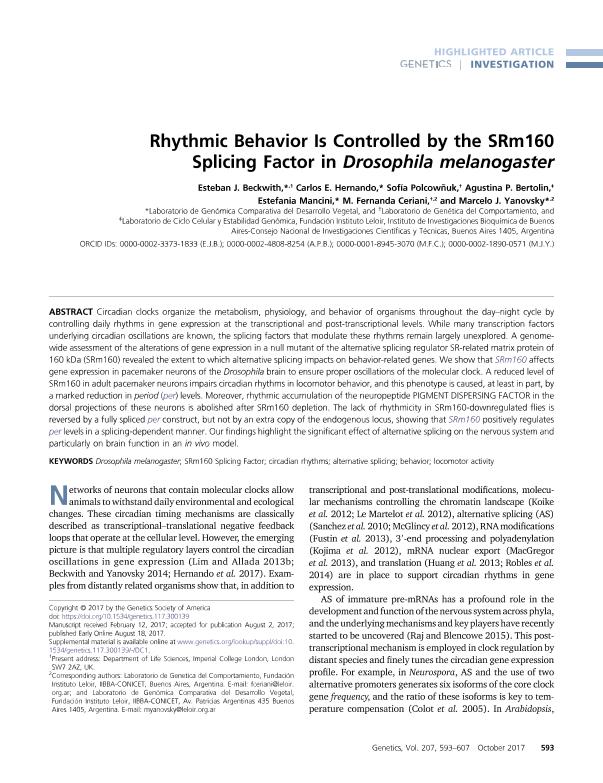Mostrar el registro sencillo del ítem
dc.contributor.author
Beckwith, Esteban Javier

dc.contributor.author
Hernando, Carlos Esteban

dc.contributor.author
Polcowñuk, Sofía

dc.contributor.author
Bertolin, Agustina Paola

dc.contributor.author
Mancini, Estefania

dc.contributor.author
Ceriani, Maria Fernanda

dc.contributor.author
Yanovsky, Marcelo Javier

dc.date.available
2018-10-24T19:26:43Z
dc.date.issued
2017-10
dc.identifier.citation
Beckwith, Esteban Javier; Hernando, Carlos Esteban; Polcowñuk, Sofía; Bertolin, Agustina Paola; Mancini, Estefania; et al.; Rhythmic behavior is controlled by the SRm160 splicing factor in Drosophila melanogaster; Genetics Society of America; Genetics; 207; 2; 10-2017; 593-607
dc.identifier.issn
0016-6731
dc.identifier.uri
http://hdl.handle.net/11336/63016
dc.description.abstract
Circadian clocks organize the metabolism, physiology, and behavior of organisms throughout the day–night cycle by controlling daily rhythms in gene expression at the transcriptional and post-transcriptional levels. While many transcription factors underlying circadian oscillations are known, the splicing factors that modulate these rhythms remain largely unexplored. A genome-wide assessment of the alterations of gene expression in a null mutant of the alternative splicing regulator SR-related matrix protein of 160 kDa (SRm160) revealed the extent to which alternative splicing impacts on behavior-related genes. We show that SRm160 affects gene expression in pacemaker neurons of the Drosophila brain to ensure proper oscillations of the molecular clock. A reduced level of SRm160 in adult pacemaker neurons impairs circadian rhythms in locomotor behavior, and this phenotype is caused, at least in part, by a marked reduction in period (per) levels. Moreover, rhythmic accumulation of the neuropeptide PIGMENT DISPERSING FACTOR in the dorsal projections of these neurons is abolished after SRm160 depletion. The lack of rhythmicity in SRm160-downregulated flies is reversed by a fully spliced per construct, but not by an extra copy of the endogenous locus, showing that SRm160 positively regulates per levels in a splicing-dependent manner. Our findings highlight the significant effect of alternative splicing on the nervous system and particularly on brain function in an in vivo model.
dc.format
application/pdf
dc.language.iso
eng
dc.publisher
Genetics Society of America

dc.rights
info:eu-repo/semantics/openAccess
dc.rights.uri
https://creativecommons.org/licenses/by-nc-sa/2.5/ar/
dc.subject
Alternative Splicing
dc.subject
Behavior
dc.subject
Circadian Rhythms
dc.subject
Drosophila Melanogaster
dc.subject
Locomotor Activity
dc.subject
Srm160 Splicing Factor
dc.subject.classification
Otras Ciencias Biológicas

dc.subject.classification
Ciencias Biológicas

dc.subject.classification
CIENCIAS NATURALES Y EXACTAS

dc.title
Rhythmic behavior is controlled by the SRm160 splicing factor in Drosophila melanogaster
dc.type
info:eu-repo/semantics/article
dc.type
info:ar-repo/semantics/artículo
dc.type
info:eu-repo/semantics/publishedVersion
dc.date.updated
2018-10-19T20:42:31Z
dc.identifier.eissn
1943-2631
dc.journal.volume
207
dc.journal.number
2
dc.journal.pagination
593-607
dc.journal.pais
Estados Unidos

dc.journal.ciudad
Baltimore
dc.description.fil
Fil: Beckwith, Esteban Javier. Consejo Nacional de Investigaciones Científicas y Técnicas. Oficina de Coordinación Administrativa Parque Centenario. Instituto de Investigaciones Bioquímicas de Buenos Aires. Fundación Instituto Leloir. Instituto de Investigaciones Bioquímicas de Buenos Aires; Argentina
dc.description.fil
Fil: Hernando, Carlos Esteban. Consejo Nacional de Investigaciones Científicas y Técnicas. Oficina de Coordinación Administrativa Parque Centenario. Instituto de Investigaciones Bioquímicas de Buenos Aires. Fundación Instituto Leloir. Instituto de Investigaciones Bioquímicas de Buenos Aires; Argentina
dc.description.fil
Fil: Polcowñuk, Sofía. Consejo Nacional de Investigaciones Científicas y Técnicas. Oficina de Coordinación Administrativa Parque Centenario. Instituto de Investigaciones Bioquímicas de Buenos Aires. Fundación Instituto Leloir. Instituto de Investigaciones Bioquímicas de Buenos Aires; Argentina
dc.description.fil
Fil: Bertolin, Agustina Paola. Consejo Nacional de Investigaciones Científicas y Técnicas. Oficina de Coordinación Administrativa Parque Centenario. Instituto de Investigaciones Bioquímicas de Buenos Aires. Fundación Instituto Leloir. Instituto de Investigaciones Bioquímicas de Buenos Aires; Argentina
dc.description.fil
Fil: Mancini, Estefania. Consejo Nacional de Investigaciones Científicas y Técnicas. Oficina de Coordinación Administrativa Parque Centenario. Instituto de Investigaciones Bioquímicas de Buenos Aires. Fundación Instituto Leloir. Instituto de Investigaciones Bioquímicas de Buenos Aires; Argentina
dc.description.fil
Fil: Ceriani, Maria Fernanda. Consejo Nacional de Investigaciones Científicas y Técnicas. Oficina de Coordinación Administrativa Parque Centenario. Instituto de Investigaciones Bioquímicas de Buenos Aires. Fundación Instituto Leloir. Instituto de Investigaciones Bioquímicas de Buenos Aires; Argentina
dc.description.fil
Fil: Yanovsky, Marcelo Javier. Consejo Nacional de Investigaciones Científicas y Técnicas. Oficina de Coordinación Administrativa Parque Centenario. Instituto de Investigaciones Bioquímicas de Buenos Aires. Fundación Instituto Leloir. Instituto de Investigaciones Bioquímicas de Buenos Aires; Argentina
dc.journal.title
Genetics

dc.relation.alternativeid
info:eu-repo/semantics/altIdentifier/url/http://www.genetics.org/content/207/2/593
dc.relation.alternativeid
info:eu-repo/semantics/altIdentifier/doi/http://dx.doi.org/10.1534/genetics.117.300139
Archivos asociados
